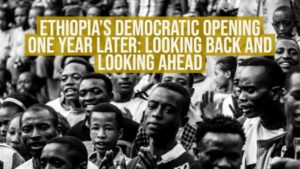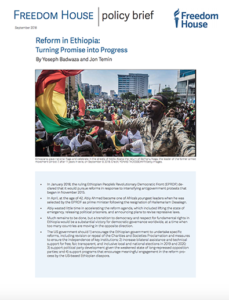Brigadier General Asamnew Tsige, accused of planning Saturday’s attacks in northern Amhara State that killed five political figures, was shot dead (Reuters/CFR) yesterday, a spokesperson for Ethiopia’s prime minister said. He was killed amid a security crackdown in which more than 180 others have been arrested, Associated Press adds (HT:FDD).
Released last year from a life sentence for plotting to overthrow Ethiopia’s government – one of tens of thousands of political prisoners to be freed by prime minister Abiy Ahmed – Asaminew’s story encapsulates the high-wire act of Mr Abiy, who is attempting to turn one of Africa’s most authoritarian but effective states into a liberal democracy, The FT’s David Pilling writes:
Mr Abiy is trying to revamp the system created by the Ethiopian People’s Revolutionary Democratic Front (EPRDF), which has ruled since a 1991 revolution…… Before he came along the EPRDF was dominated by Tigrayans, the ethnic group that led the 1991 revolution and makes up just 6 per cent of the population. …The appointment of Mr Abiy, the first Oromo leader in Ethiopia’s history, acted as a safety valve. He took things further. He embraced the values of liberal democracy, freeing up the press, unbanning political parties (even ones with guns), releasing political prisoners and promising competitive elections in 2020….. The result has been liberating. It has also been chaotic. Mr Abiy has unleashed a torrent of pent-up ultranationalism in which the rights of the country’s nine ethnically based regions threaten to supersede those of the unified Ethiopian state.
 Clionadh Raleigh, an Ethiopia expert at the University of Sussex, wonders whether Mr Abiy has taken his liberal principles too far too quickly. “He is,” she says, “trying to move from a functioning autocracy to a competitive autocracy.”
Clionadh Raleigh, an Ethiopia expert at the University of Sussex, wonders whether Mr Abiy has taken his liberal principles too far too quickly. “He is,” she says, “trying to move from a functioning autocracy to a competitive autocracy.”
The political ramifications may be far reaching in a country that hitherto stood out for offering hope of political and economic reform in Africa, The Economist adds:
Some now expect a campaign to suppress “nationalist” forces in Amhara, including youth groups and opposition movements. This in turn may stoke further resentment in the region, in which many young people are beginning to feel discriminated against by Abiy and his Oromo faction of the ruling coalition.
Ethiopia experts say the prime minister must tread carefully as he tries to restore security. Too strong a response risks derailing his reforms and angering a polarized population. But failure to punish those responsible could see violence could spiral out of control, Reuters reports.
 The government should channel public anger through dialogue, but if ethnic rivalries spread to the federal armed forces, that could destroy the state, said Mehari Taddele Maru, an independent Ethiopian analyst.
The government should channel public anger through dialogue, but if ethnic rivalries spread to the federal armed forces, that could destroy the state, said Mehari Taddele Maru, an independent Ethiopian analyst.
Ethiopia analyst Awol Allo from the University of Keele in the UK, agreed that ethnic tension was to blame for the attempted coup.
“It is known that there is a tension in the Amhara region between those who want to go for a different direction,” he told DW. Some, such as Asaminew, wanted to advance Amhara nationalist views. “There are some who would like to work with the central government to make it more harmonious. It is known that this controversy between them becomes worse from time to time. I think this is the cause of the current problem.”
But other observers dismissed the idea of a coup.
“There was no attempt at a coup d’etat, because a coup d’etat implies significant movement of troops or the seizing of control of strategic points like airports or media,” said French researcher Gerard Prunier.
International Crisis Group analyst William Davison agreed that there was no sign of an attempt at seizure of national power.
“It was definitely an attack on the Amahra leadership and there may have been an ambition to take control of the regional government, but (the attackers’) intentions are not clear,” he told AFP. “Hopefully the government will provide more information soon on the incidents and the connection between them.”
 Ethiopia’s transformation from autocracy to democracy is of great consequence and deserves the support of the world’s democracies, said Carl Gershman, President of the National Endowment for Democracy, the Washington-based democracy assistance group. At a time when democracy in many countries is being threatened by malignant nationalism, illiberal populism, and religious extremism, Ethiopia can be a model of civic nationalism and show that it is possible for a multi-ethnic country to build an inclusive system that allows people to be themselves, he told a conference in Addis Ababa last week.
Ethiopia’s transformation from autocracy to democracy is of great consequence and deserves the support of the world’s democracies, said Carl Gershman, President of the National Endowment for Democracy, the Washington-based democracy assistance group. At a time when democracy in many countries is being threatened by malignant nationalism, illiberal populism, and religious extremism, Ethiopia can be a model of civic nationalism and show that it is possible for a multi-ethnic country to build an inclusive system that allows people to be themselves, he told a conference in Addis Ababa last week.
Ethiopia has lived under an authoritarian government for many, many years. And so when you try to change that overnight, it’s releasing this pressure valve, says Felix Horne, an Ethiopia researcher at Human Rights Watch. At the same time, as the security forces have been reformed and you have seen a security void, people are finally able to express decades-old grievances, he tells Foreign Policy:
 Often that means engaging in score settling against other ethnic groups, over complex questions of identity and land, and border demarcation, which are very explosive in Ethiopia, and are finally being expressed again in that security vacuum… The institutions that would be expected to resolve those grievances—whether it’s the judiciary, or independent media, or civil society, getting more attention on those issues—those institutions are still not independent, and they’re taking steps in that direction, but they’re not there yet.
Often that means engaging in score settling against other ethnic groups, over complex questions of identity and land, and border demarcation, which are very explosive in Ethiopia, and are finally being expressed again in that security vacuum… The institutions that would be expected to resolve those grievances—whether it’s the judiciary, or independent media, or civil society, getting more attention on those issues—those institutions are still not independent, and they’re taking steps in that direction, but they’re not there yet.
Elections in 2020 may no longer be feasible, says the Crisis Group’s Davidson. “Unless the crisis is addressed, it is going to be hard to get the kind of political and security conditions necessary to proceed with the peaceful, constructive and competitive elections that Abiy has promised,” he tells The FT.
Whatever the exact details of the events on June 22nd, the euphoria that greeted Abiy’s rise to power a year ago is beginning to seem a distant memory, The Economist adds.







